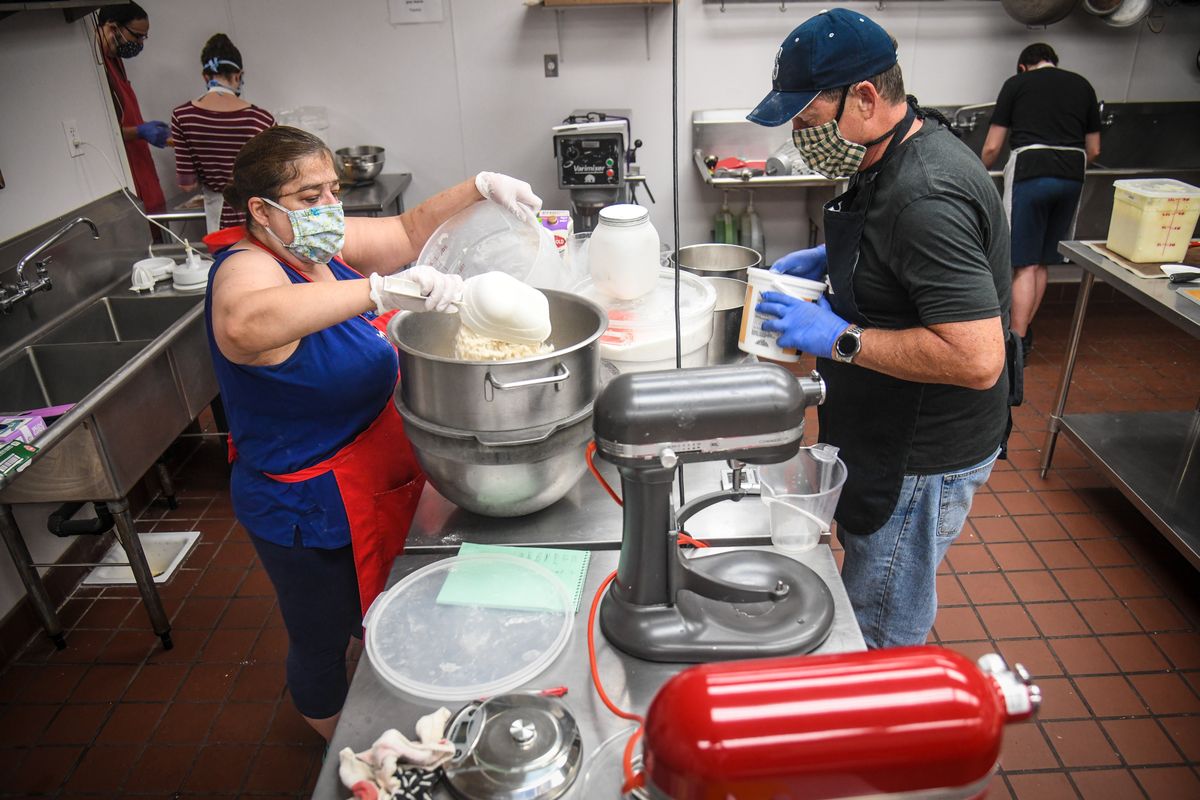Kitchen Spokane planning expansion into Spokane Valley Mall

A nonprofit organization that provides commercial kitchen space to help food entrepreneurs launch and maintain their businesses is expanding into the Spokane Valley Mall.
Kitchen Spokane anticipates opening next month in two spaces formerly occupied by Taco Time and Ivar’s Seafood Bar in the mall’s food court, said Jayme Cozzetto, Kitchen Spokane director.
Kitchen Spokane, which aims to help small businesses start operating at a fraction of the normal cost, launched its Spokane Valley-based standalone facility in 2014 at 1014 N. Pines Road. It has since grown to include five additional locations in Washington and Idaho, most of which are located in malls.

“Malls are uniquely suited to what we do because they have the infrastructure already,” said Cozzetto , adding most sites have a kitchen hood, electricity and plumbing available.
Cozzetto had been considering the Spokane Valley Mall as a potential location for a new shared-use commercial kitchen for nearly a year. When he noticed the space formerly occupied by Taco Time was vacant, he contacted mall owner Brookfield Properties and signed a lease.
Kitchen Spokane has a unique agreement with Spokane Valley Mall that allows its clients access to the shared-use kitchen 24 hours a day, Cozzetto said.
Another advantage of the new location is that Kitchen Spokane doesn’t need to generate retail sales to survive in the mall, he said.
The shared-use kitchen offers dry, refrigerated and freezer storage, cooking utensils and equipment. Kitchen rental is $15 an hour. Storage starts at $3 per day. Kitchen Spokane’s facilities are approved by the Washington State Department of Health, the Idaho Department of Health and Welfare and the U.S. Department of Agriculture to meet food-processing guidelines, Cozzetto said.
Kitchen incubators, which offer space for rent as well as mentorship and support to aspiring restaurateurs and small businesses, have emerged as a culinary business trend in the past decade.
There are more than 600 shared-use kitchens nationwide, with most concentrated in larger cities, according to a recent report by Philadelphia-based Econsult Solutions. River City Kitchen, a culinary incubator, opened in November in the Spokane Intermodal Center.
Kitchen Spokane, in addition to expanding into Spokane Valley Mall, is also planning another location in Coeur d’Alene that will be opening next month in Silver Lake Mall, Cozzetto said.
The nonprofit’s expansion is fueled, in part, by an uptick in demand for catering and meal delivery businesses, Cozzetto said.
“We are seeing good growth overall,” said Cozzetto , adding catering and meal-prep services are adapting to online ordering and delivery amid the COVID-19 pandemic.
Kitchen Spokane has also rolled out a finance program this year to help small businesses obtain financing to expand operations.
Cozzetto, a former co-owner of the Bangkok Thai restaurant chain, launched the nonprofit in a local hotel’s vacant kitchen. It rapidly outgrew the space. With the help of Greater Spokane Incorporated, Cozzetto was able to secure a larger site on Pines Road.
When Cozzetto realized that several Idaho residents were using the Spokane Valley facility, he decided to expand into Silver Lake Mall in Coeur d’Alene, which is now home to two of the nonprofits’s shared-use kitchens. He also opened locations in Sandpoint and Vancouver, Washington.
Clients include mobile food vendors, food trucks, pop-up vendors and producers that participate in farmers’ markets, he said.
“I started with four clients and here we are today with 75 clients that utilize six kitchens across Idaho and Washington,” Cozzetto said. “I think every city should have something like this because it’s an essential infrastructure.”